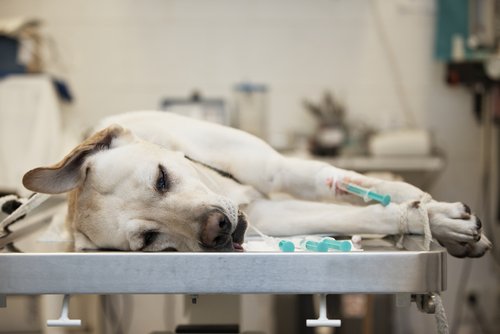Canine Hepatitis: Causes Symptoms and Treatment


Written and verified by the lawyer Francisco María García
The liver is an extremely important organ for all animals. As for dogs, its function is quite similar to humans. However, do you know what Canine Hepatitis is?
A dog’s liver is responsible for the following functions:
- Metabolizing fats, carbohydrates, and proteins.
- Helps store vitamins and minerals.
- It’s crucial for digestion.
- Detoxifying waste and any other harmful substances
- Produces the substances which allow the blood to coagulate.
These are the most important functions. However, according to some studies, a dog’s liver preforms more than 1,000 different bodily functions, making it a very important organ.
What is Canine Hepatitis?
Canine Hepatitis is inflammation of the liver, in which its cells go through different types of damage.

Causes
There are different reasons why a dog could develop canine hepatitis:
- Ingesting urine, feces, or saliva of an infected dog.
- Poor diet.
- Poisoning by foods or medication.
Depending on the cause, canine hepatitis can be classified as the following:
Types of Canine Hepatitis
Common Hepatitis: the inflammation of the liver is caused by the ingestion of medication or a poisonous substance that damage the liver. Unfortunately, the symptoms appear once the condition is quite advanced.
Autoimmune Hepatitis: This type is caused by an “error” in the dog’s immune system. As a result, the immune system confuses the liver cells with harmful agents and attacks them.
Canine Viral Hepatitis: also known as Infectious Canine Hepatitis or Rubarth’s Disease, which is caused by a virus: Canine Adenovirus 1. It infects dogs and foxes, and is caught from the saliva or feces of other infected animals. It’s a strong, resistant, and extremely contagious virus that can be fatal.
Symptoms of Canine Hepatitis
The symptoms of this condition can be confused with other diseases. So, be keep track of your dog’s health and talk to your vet if you have any doubts.
Symptoms include the following:
- Loss of appetite.
- Vomiting or diarrhea.
- Constant thirst.
- Pain or inflammation in the abdomen.
- Swollen glands.
- Erratic behavior (loss of coordination).
- Yellow color in the eyes and mucous membranes (jaundice). This symptom is very obvious.
The symptoms don’t all appear at the same time or at the same extent.
Treatment
Treating Canine Hepatitis is just like most disease, it depends on the cause of the condition. It’s always best to prevent and vaccinate.
Treating Common Hepatitis:
Symptomatic treatments can be done to avoid any pain or discomfort. It is known as the easiest method to treat Canine Hepatitis. The vet will also assess if there is an influencing factor to stop the dog from getting sick again. During the treatment, the dog needs to follow a strict diet provided by a specialist.

Treating Autoimmune Hepatitis:
Again, you have to treat the symptoms. The dog may also receive medication to control immune system function, called immunomodulators, which prevent liver damage.
Treating Viral Hepatitis:
The dog will be administered with anti-inflammatories and antibiotics to fight secondary infections. You can never get rid of this virus completely, so you need to counteract all possible symptoms. Therefore,you can use medicines to alleviate vomiting and diarrhea.
In addition, the dog will need to follow a strict low-protein diet for liver infections and get plenty of rest while being symptomatic.
Prevention
Healthy habits will help prevent diseases such as hepatitis. Some of these habits are the following:
- Balanced diet.
- Daily exercise.
- Spending time in the fresh air.
- Affection and attention.
Finally, its’ worth mentioning that vaccination is best prevention method for viral hepatitis. Therefore, it’s recommended to take your dog to the vet at an early age to get all necessary vaccinations. Likewise, if you adopt an adult dog, you should take him to vet for vaccinations.
This text is provided for informational purposes only and does not replace consultation with a professional. If in doubt, consult your specialist.